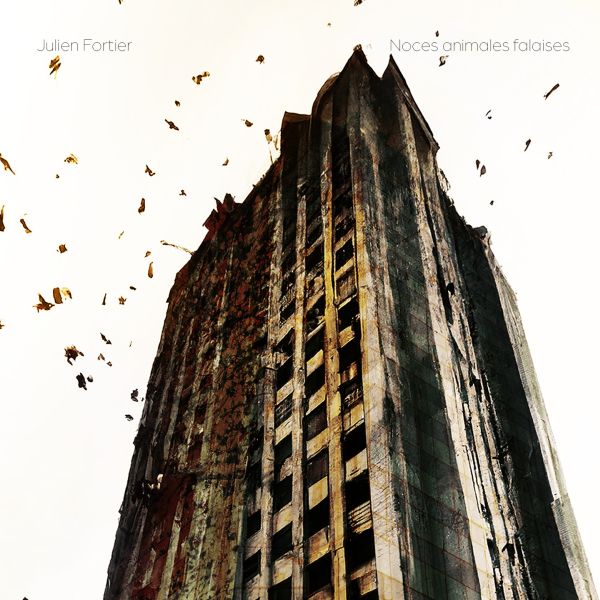
Fortier, Julien
Noces Animales Falaises
Animal Cliffs Wedding: these three words collide in a sort of crash. Julien Fortier's fourth album explores the collisions between forms: this album is the obvious union of two parallel writings. The first, profoundly literary, is presented in the form of a collection. It's about surrendering to the poetic gesture first, impulsive in its fever to seize, even if in filigree, what passes through and escapes. In this collection, the language is chopped, fragmented, and crossed out, sometimes cruel and obsessive. Poetry emerges between the fragments. The poet connects to the world through figures, populating it with archetypal creatures, bringing together Judeo-Christian imagery and pop culture. Then emptiness, this world, and finding oneself in it, naked and alone, like a man - "moist as a father / bent as a prayer". these words mark the end of the song "Silences." Then another language shifts the first one. It modifies its contours. It forces it to abandon its form, to twist and sharpen, to let itself be caught in its splinters: the music gathers the fragments. Dull, thick, and dark like a mass, it is also rock, electro, and vertigo. It moves along the edge, suspended between ascent and descent. Filled with hope, it embraces what words prohibit - "despair" had been erased from the collection. The album's pieces are organized like a show, sometimes ritual, sometimes tragedy or masquerade. It's no longer Julien Fortier singing his writings. it's someone else, a character prey to this universe that overwhelms him, maltreats him, and plays with him. This new album allows the junction between a heritage poetry and an ultra-contemporary experimental practice. Thus, Baudelaire's Romantic Sunset rubs shoulders with the barbed wire hell in "Par ici l'homme": "The crooked man / Kneeling in the clearing / Spreads the wires without his hand trembling...". It's an album of collisions, sometimes asserting itself as kitsch, sometimes gothic, where Egon Schiele mingles with Gotham City (the painter and the fictional city jointly inspired the song "Die Familie"), where emptiness is contemplated from both above and below. Julien Fortier once wrote, "Man is not here to fill the void but to point it out," for those who can hear. As a teenager, Julien Fortier discovered Rimbaud and Seattle rock. He practiced music and poetry in parallel, not expecting the stage to suddenly fall into his lap. "Le linceul à fleurs," a text written at the age of seventeen with the enthusiasm of youth, was adapted a few years later by the Montpellier director Marc Nicolas. Julien Fortier, initially an author, became a composer for the show, and then took the stage himself. While completing his literary studies, music, theater, and writing occupied him. He founded the band Aménie with which he released a debut album. In 2011, his first album under his name, "Chloé," was released, followed by "Cavales" in 2016. For "Noces Animales Falaises," Julien Fortier first wrote and composed in solitude, finding intimacy amidst the 660's bustle. The gaze, once turned inward, shifts and clings to otherness. He experiences undying nostalgia and the absurdity of it all. He scrutinizes the symbols that silently structure everything. He journeys through convolutions and magical formulas, searching ceaselessly in the irresolvable, where only the poetic gesture matters. Then he shares: the project reaches its fruition with David Darmon, a sound engineer whose precious collaboration made the record possible, and musicians Florian Beigbeder, Romain Delorme, Damien Bianciotto, and Laurent Guillot, who infused their talent into it. The visuals are also the result of a collision: created from raw material generated by artificial intelligence, they evoke an augmented and ambiguous reality: it's a precipice or an emergence, it's a burning building or a flight of birds, they are angels or debris. On stage, after many explorations on previous albums, the chosen format is reduced to a trio. There will be Julien Fortier on vocals and guitar, Thomas Terrien on piano, and Romain Delorme on bass. Bringing this new repertoire to the stage is a challenge to its darkness: to illuminate it so that it can unfold in its density. Lili Nyssen